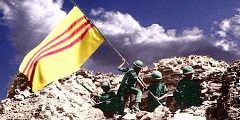*** TRỨNG KHOÁN XUỐNG DỐC KHÔNG PHANH,
POOTIN MAU GỬ CHO ANH H̉N CHÈN. ***
(NLĐO)- Thị trường chứng khoán Trung Quốc hôm 7-7 tiếp tục đi xuống sau khi trượt dốc thê thảm, mất 3.200 tỉ USD trong ṿng 3 tuần qua.
Thị trường chứng khoán đất nước đông dân nhất thế giới hầu như không cải thiện sau các biện pháp trợ giúp của chính quyền trong những ngày gần đây.
Các biện pháp trợ giúp của Bắc Kinh chưa phát huy tác dụng. Ảnh: Reuters
Trước khi thị trường ở cửa hôm 7-7. Thủ tướng Trung Quốc Lư Khắc Cường đăng tải trên trang web chính phủ rằng Trung Quốc tự tin và có khả năng giải quyết với các thách thức của nền kinh tế. Tuy nhiên ông lại không đả động đến sự trượt dốc suốt 3 tuần qua khiến cổ phiếu Trung Quốc mất khoảng 30% kể từ giữa tháng 6.
Sau khi tạm chững lại hôm 6-7, chỉ số CSI300 của các công ty lớn nhất tại Thượng Hải và Thâm Quyến đă giảm 2% trong phiên giao dịch hôm 7-7 trong khi chỉ số Composite Thượng Hải SSEC giảm 1,4%.
Đáng chú ư, chỉ số ChiNext - chỉ số gồm các công ty nhỏ hơn của Trung Quốc, giảm tới 5,1%.
Nhà phân tích Qi Yifeng thuộc hăng tư vấn tài chính CEBM cho biết các biện pháp trợ giúp của chính phủ không đủ mạnh để đảo ngược t́nh thế.
“Đây chỉ là vấn đề liệu thị trường sẽ trượt giảm chậm hơn hay tiếp tục rơi tự do” – ông Qi nhận định.
Các nhà đầu tư toàn cầu ngày càng gia tăng lo ngại về thị trường chứng khoán thất thường của Trung Quốc, đồng thời lo ngại về một sự sụp đổ toàn diện có thể gây mất ổn định đối với nền kinh tế số 2 thế giới.
Theo Reuters, các nhà đầu tư nước ngoài chỉ nắm giữ khoảng 3% tổng cổ phiếu tại Trung Quốc nên khả năng thao túng thị trường này chỉ có thể là các nhà đầu tư trong nước.
Trung Quốc có khoảng 90 triệu dân là các nhà đầu tư chứng khoán. Hầu hết người thiệt hại trong các đợt thị trường lao dốc này là các nhà đầu tư nhỏ.
Đỗ Quyên (Theo Reuters)





 Reply With Quote
Reply With Quote





Bookmarks